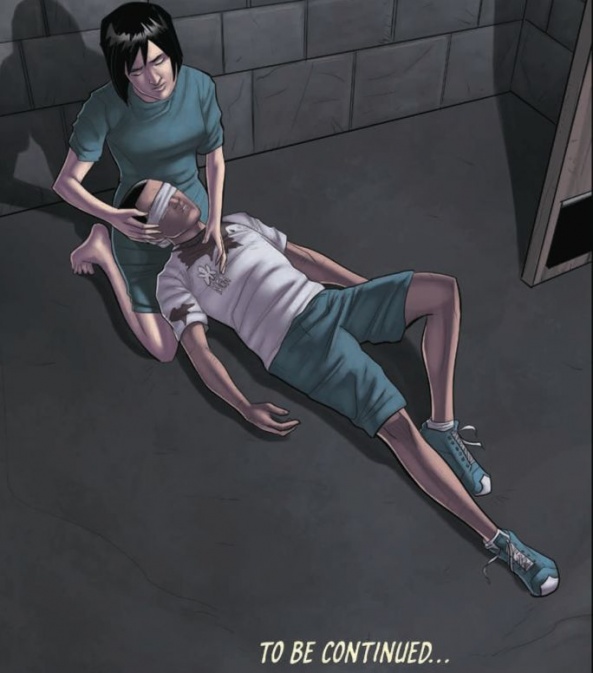

Hello and welcome back to MGA Study Hall, where all things Morning Glories are analyzed, dissected and poured over with the hope that we can figure out just what is going on!
Today’s issue is issue #37, the Akiko issue. You may or may not be reading this article, depending on your thoughts on dreams and angels.
Join me as I discuss the issue, its story and the possible hidden secrets that we may or may not be picking up on. I should note: this column contains massive spoilers for the issue. Enormous. Colossal, even. The issue is out today, so make sure to read it first before you read our thoughts. It helps to give the issue a few read throughs before coming to us, but consider this your warning about impending spoilers.
As always, our very lovely/supremely awesome column header was designed by the graphic designer for the actual book, Tim Daniel! For more of Tim’s work, please visit his site Hidden Robot and be on the lookout for Tim’s comic debut, Enormous, now in stores and formerly serializing here on MC! Many thanks to Tim for being fantastically awesome and providing it to us.
One more thing before we begin, as I’d like to continue to throw out this short plug:

For more details, click the image above. As for myself, I’ve got theorizing to do. Let’s kick it off.

De-Loused in the Comatorium
In this issue, we enter the brain of Akiko as she finds herself in a coma, exploring her past and the events that brought her to this point. It’s an interesting exploration as this series has often times put us in dreams in order to give us clues towards the overall message and hidden meanings of the series. It’s perhaps the narrative trope that the book favors the most, giving us a pseudo-glimpse into events via a blurred focus lens.
In fact, a large part of the book deals with the active use of the conscious mind of the characters. So much power seems to be hidden there, which has resulted in the manifestation of various abilities. The ideas of powers have certainly been discussed endlessly within the context of the series, but it all seems to be centrally located out of the development of the mind; that is, for example, why the book being set in a school makes more and more sense as we go on. The more a mind is pushed to succeed (by way of various forms of education), the more power someone is able to seemingly manifest — with a few obvious exceptions, granted.
As such, it sometimes becomes difficult to tell what is real or what isn’t; characters travel to shared dreamspaces, they control the minds of others or even see events from the past and the future – yet it all seems to be out of their control. It seems like characters are often led through dreams, such as Jade being pulled along in issue #10 or Hunter in #28, almost as if someone is trying to tell the central character something but is unable to do so directly. And it’s probably not any specific person trying to do this, mind you, but that does seem to be the inherent pattern.
Continued belowOr it’s God. But we’ll get to that later.
What I’m getting at is: we’d never been in a coma before, though, and it appears that things are slightly different – and in fact, perhaps a bit more focused. With Akiko, there seems to be some semblance of control, even if it is not necessarily from her; she still appears to be guided down a path, one that shows her various important people and moments from her life and all of which lead her to Jade (whom she doesn’t appear surprised to see), but it seems like Akiko is leading herself down the path more than having a guide, whether it be a dream version of Megan or a more present iteration of Future Jade. Akiko is never inherently in full control, but she at least seems more comfortable being put into these various positions and circumstances, almost as if she’s somewhat aware or content with what is going on.
So that brings up the question: if Akiko is in a coma, and Akiko is having visions in a coma, what — or who — is causing them?
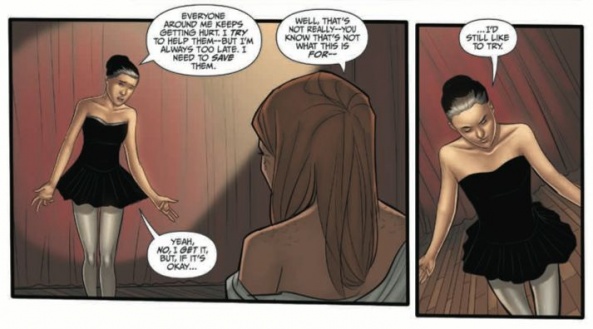
Akiko’s Journey, Prelude: The God Variable
We’ll get more into this later, but I want to assume that you’ve read the issue and talk about one thing before we talk about the issue in a more sequential manner.
So Akiko is has these visions at the end of the issue, and everyone she seems to see are related to people she could help. And when Akiko notes that she needs to save people, in particular from having just seen the death of her father, Future Jade tells her “that’s not what this is for.” We’ll get into this a lot more in-depth soon.
But for now, what this seems to imply (if I may go this far as to assume) is that this vision in her coma was delivered to her by God (or whatever deity we want to subscribe to in this series) in order to show her what she needed to do. There have been many religious aspects to the book up to this point (this issue alone features a direct biblical passage used, which we’ll talk about), but belief in a higher power is the strongest recurring one, with many characters leaning on His existence for various crutches.
After all, one of the earliest lines in the issue is about having faith and about Clarkson being an angel (which we’ll get to later). This doesn’t seem to be something Akiko questions, but rather simply acknowledges as truth. Faith is all about belief, about just knowing that what you believe in is actuality, and that’s a prime component to any devotion in religion. And this is something we’ve seen throughout the series, with Akiko referring to Abraham as “Father Abraham” (a sign of respect, sure, but also a typical way to refer to a priest). Given everything that this issue shows to Akiko and eventually sets her up to do at the end with her interaction Fortunato — the poster boy character for having faith in a higher power in this book — it doesn’t seem particularly out of place to inherently believe that someone is showing Akiko this visions on purpose.
So if this vision was delivered, this would ostensibly be the first sign of actual proof or a higher power within the series.
But if we also accept within the series that we “made their own gods,” as is the recurring phrase, what does that mean for Him?
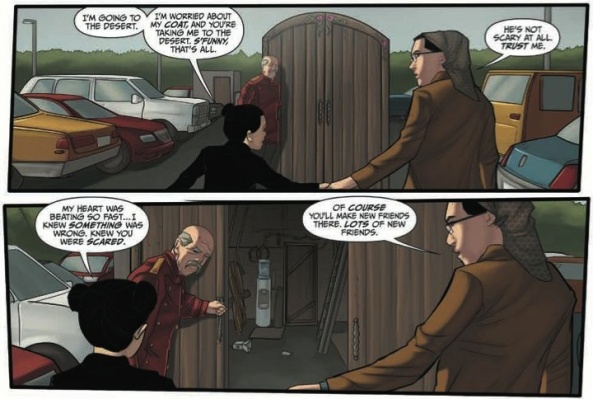
Akiko’s Journey, Part 1: Getting Ready for the Stage
So to make this all a little bit easier, we’re going to go through this issue scene by scene in order to break down some aspects of the whole piece.
We’ve already talked the first couple pages to death, but I would also like to focus on the door that Akiko travels through. With some morning glories adorned at the top, a set of doors appear in the middle of the parking lot which open to what I’ve been led to understand is a “backstage area.” Nothing in that area seems particularly of import as it’s all just sort of generic items, but it’s interesting that the doors would appear at all. One has to imagine that Akiko was dreaming, and if we’re going to believe all we talked about earlier with a higher power trying to reach her, then it was that which allowed the door to appear which in turn allowed Akiko to break out and become a bit more in control of the events of her dream.
Continued belowIt’s also worth noting that in this scene Akiko breaks character and seems to be outside of the event. Obviously she’s remembering it, it’s something from her past, but it’s clear at this point that she has begun to take control — whether because she was allowed to or because she simply took hold. You’ll also notice that the panels start to angle and distort a bit as the previous fluidity of the scene begins to fall apart, which perhaps explains the arrival of the door more than anything.
That and, well, her arrival on stage in front of Future Jade later. But we’ll get there.
One last thing I’ll note: while Akiko talks about how Clarkson will take her to Abraham, Clarkson never actually says that is where she’s going. You can infer, sure, and Akiko makes reference to how she felt at Abraham’s compound, but given what happens later in the issue — with the Scientist, with her father — it’s possible that she went… somewhere else.

Akiko’s Journey, Part 2: Guess Who Isn’t Dead
So now we see what Akiko’s situation is: she is in a coma, and she’s in a room with Mr. Gribbs — who is apparently not dead.
It’s weird to see that, right? Because, like, he was super dead last time we saw him! Dude got shot in the head — how do you survive that?
Well, apparently if you go back to issue #24 and re-examine the scene, it might become a bit more apparent. Looking at it now, it’s clear that the bullet didn’t go through his head. Yeah, he got shot in the back of the head, but it’s also possible that the bullet simply graze along the side of his skull, causing impact and damage to the brain without actually killing him. After all, apparently Nurse Nine has said that the bullet missed his brain, so your guess is as good as mine as to how the bullet went in and/or out without actually killing him.
What is important to note about the scene, though, is Akiko does seem conscious of what is going on in the real world around her. I don’t know if assuming anything is fair game in this book (we assumed Gribbs was dead…), but Akiko seems pretty cognizant of her surroundings. We simply have to gauge why. Is she just in her room and awake but unable to move, or is she having an out of body experience — perhaps in direct relation to using her mind to project herself outside of her body in a way that can only be seen or perceived by those she wants to see and perceive her?
I’d put my money on the second option.

Akiko’s Journey, Part 3: Pillars of Salt
Ah, yes, the story of Lot. It’s a famous story from the Bible, sure, albeit one perhaps one of the less famous ones. My favorite version of it is the one from that Murder By Death song.
In the book, we come in at the end of Abraham’s lecture so we don’t get the full story. For those unaware, it basically goes like this: Sodom and Gomorrah were two cities that God passed judgement upon (for differing reasons, depending on who is trying to use the metaphor of the story to their advantage), so He destroyed them. It’s assumed that both cities were wicked and reveled in sin, and that God was enacting a form of divine retribution upon them. However, God revealed to his chosen acolytes Abraham and Sarah via some angels (remember this) and revealed to them His decision, and the same went for Abraham’s nephew Lot, who gave hospitality to the angels. However, people of the city of Sodom came to Lot’s house and demanded the angels be given to them so that they could have sex with the angels. Lot said no, offering up his daughters instead, and when the people refused and the threats increased, Lot and his family were instead rescued by the angels and saved from the destruction of the city. The angels told Lot and his family not to look back on the city as they destroyed it, but Lot’s wife did, and as such she was turned into a pillar of salt.
Continued belowIt’s a weird story.
However, as Ian points out, it’s pretty much a tried and true story about the validity of faith. If you have faith that God knows what He is doing, if you trust Him and his decisions and do as you are told, then you are rewarded — in this case, escaping the destruction of the city. If you disobey, however, there are consequences — in this case, being turned into a pillar of salt.
The discussion that ensues does a pretty good job of laying out the subtext in a way that I don’t feel I really need to. There’s Ian’s side of things, the aforementioned, and there is Abraham’s side of things which is a lot more optimistic overall. Little Akiko’s response is interesting, because she looks sad while she delivers her thought, Abraham looks contemplative, and Current Akiko’s reaction is just like, “Gee, what the heck was that about?” It’s a bit cynical/jaded, even, which is interesting. But Akiko’s journey in the issue is nothing if not basically a biblical fable: Akiko is shown the potential that her faith can bestow upon her life, and has to travel along a road to decide if that’s worthwhile.
So Akiko is basically remembering this situation and is given two options — she either has faith because she fears vengeance, or she has faith because she has faith. Will she accept her role, or does she feel it’s a role she needs to challenge? And what possible consequences could challenging her role have?
We also get the line “to stop running” again, which is something that has been largely associated with Hunter previously.

Akiko’s Journey, Part 4: The Scientist
Akiko finds herself in a lab, not dissimilar to the one we’ve seen in the past. This version seems to most resemble the one that Hunter and Zoe stumble into back in issue #15. It’s similar to the Byrne-esque lab we usually see, but things look shut down, offline and older.
Akiko finds herself interacting with the unnamed Scientist who first appeared in issue #10 (who we’ll call the Scientist from now on and say that we’re calling him that because of the Coldplay song because everyone knows Nick Spencer loves Coldplay) , and he tells her that she’s supposed to be resting (implying that she’s not supposed to be traveling around in her coma?), and that she’s misinformed and a disappointment. Her interaction with David seems to have caused her coma, but apparently there’s a bit more to it than that — and perhaps whatever her mission was at the school is now being compromised by her willingness to take risks based on incorrect information and assumptions.
See, it appears that wherever she is, Akiko had been here before. We know Jade and Hunter are somehow linked to this place, and perhaps even Ian (given his relation to Oliver Simon and the Scientist’ reference to Simon back in issue #10, long before Oliver had even appeared as a cameo in the book), but Akiko seems to be aware of this place enough to be afraid of it. She may not let us know what it is, but she seems violently adamant about getting out.
The Scientist makes some interesting remarks, certainly, but all of them seem to tie into creation — of life, the universe, of everything and anything. It’s generic and we’re uncertain. The Scientist quotes Max Planck, a Nobel Prize winning physicist responsible for the creation of quantum mechanics, which analyzes matter and energy with hopes to explore the creation of the universe.
But wait — why Planck? And why does that sound familiar? Oh, right: because we first heard about them back in issue #6 with Julie Hayes, back when we first met her and saw her working on the project that resulted in the Cylinder.
Here’s the full quote:
I regard consciousness as fundamental. I regard matter as derivative from consciousness. We cannot get behind consciousness. Everything that we talk about, everything that we regard as existing, postulates consciousness.
Which is essentially saying that reality and everything we understand about it comes from the fact that we are able to study and acknowledge its existence. This once again puts the burden of everything on the mind, as discussed earlier, and ties directly into the idea of Akiko traveling through these various places and things and events within her coma.
Continued belowThe mind is the key to everything, you see. And, if the Scientist is to be believed, in Genesis. Not just the biblical book, but rather the idea in general. “In this, the story of creation” is an interesting line, certainly.
With all this religious context floating around, it’s interesting to see how science and faith are inter-mingling.

Akiko’s Journey, Part 5: Little Ian in Dreamland
After escaping the Scientist, Akiko finds herself in Ian’s room. Ian’s working on some science homework here, as his comments (“light rays move at one unit of space per unit of time”) describes the speed of light. Hunter comes in and mentions that they need to go into the dreamscape in order to talk about a certain issue, “the dude downstairs.”
This scene is mostly another notch on the rung of this being an out of body experience and not just part of her dream. What is interesting, though, is that Hunter mentions “the dude downstairs” and Akiko instantly assumes he means Fortunato. I’m not saying that he doesn’t, but consider the following: a) how would the boys know about Fortunato? and b) how would Akiko? I mean, realistically, there are probably lots of dudes downstairs. There’s, like, a whole basement complex full of people! I’m not saying rumors aren’t traveling about, and certainly Ian being locked up in the dungeon gives him an idea of the whereabouts of Fortunato ended up (see: the end of issue #29), but does Ian know about what Daramount did to him? How sequential are the events that we are seeing?
An assumption that you could make is that given that the Fortunato issue came out before the Ian issue, he may have heard everything that Daramount did to Fortunato. It’s possible. But if so, what did he tell the others? Ian’s issue was focused on him for the obvious reason that this arc is giving us the backstory of some of the Truants, but when did what happened to Fortunato come up? And why?
And given where Akiko ends up, how much does she perhaps know? We knew that Akiko had some feelings for Fortunato, if perhaps unrequited ones, and her actions that put her in a coma directly relate to him (in a way, I guess), so is she just assuming? Or does she legitimately already know something? It’s certainly possible.
But then Akiko runs out of the room, assumedly following Hunter (with running once again associated to Hunter, and also associated to Abraham’s story about wanting to be with people and needing to stop running), and finds herself in Wow-Mo Industries.
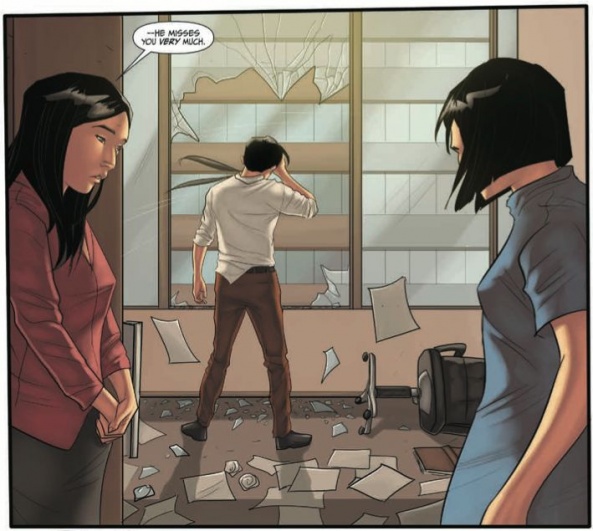
Akiko’s Journey, Part 6: The Sins of our Fathers
A recurring aspect of the book has focused on the relationship of children to their parents. It’s been a huge element of the series; no one in this series seems allowed to have what might pass as a normal childhood, and Akiko is certainly no exception to the rule. She seems to come from an OK home, even if her parents were grooming her to be taken away, but they at least seem to have wanted to prepare her for what was to come.
As such, we learn that her father was an employee of Wow-Mo, the corporation Hisao met Hodge at in issue #33, and that he killed himself, assumedly when Akiko was younger.
What’s particularly interesting about this scene is the dialogue. We knew Wow-Mo had some kind of connection to the school after #33, but this would ostensibly solidify what that could be. Akiko’s father refers to the nefarious “they” (assumedly in regards to the Academy) and says ‘to be as gods,’ which is in line with other recurring phrases that we’ve seen throughout the series (“so we made our own gods”). The general implication here is that he sold out his own daughter (going so far as to say he killed her) — which seems to further imply that whatever it is that makes the children special could somewhat be manufactured, at least in some cases. This would, in turn, explain Akiko’s previous scene with the Scientist, and perhaps even why she’s afraid of him.
So for Akiko, it seems her father allowed something to happen to her that eventually led her on a path to the Academy. And again I ask – what does this portend to the actual existence of a higher power within the narrative?
Continued belowAlso, one thing I have to ask: did Akiko actually witness this scene? I would tend to believe that she didn’t. If she did, you’d imagine that the circumstances to which she was led to her father would be a little bit different, but at the same time, he speaks directly to her. His comments about her as “little one” could imply that she saw this when she was younger, but then when she first arrives at Wow-Mo!, the lady at the front desk says “my, how you’ve grown!”
So how did she end up here? Was she perhaps sent back in time, or is she just imagining it? I’d wager that she’s imagining it all, personally, but there’s enough evidence (circumstantial at best) to imply that she was actually there to see the death of her father.
I have a theory on this. We’ll get there soon.
Oh, and Before We Move On
I skipped bringing it up earlier, but speaking of family, Akiko has a sister:

I wonder if that will be coming back in the future?
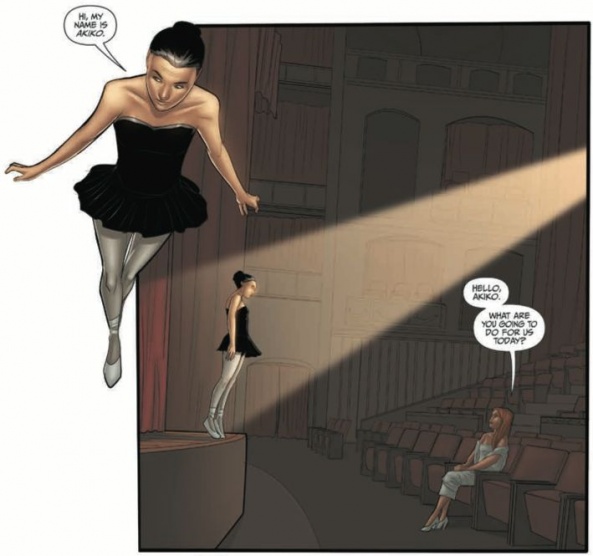
Akiko’s Journey, Part 7: “Hi, my name is Akiko.”
Akiko arrives finally upon the stage she was being lead to at the beginning of the issue, and this is where she meets Future Jade, draped in white. We can probably assume that this is for the first time as the two do not seem to have any inherent familiarity for one another. I would probably assume Future Jade knows who she is, but if anything, I’d bet that Akiko only has a guess or two why she’s there.
So she performs for Jade. We don’t know what ballet she is performing (I asked Joe, and he replied that it was nothing specific), but she seems to be performing it specifically for Jade. The question I would ask here is, what role is Jade in this situation?
Future Jade has been seen on a number of occasions, both interacting with herself and with Hunter. It’s not unheard of her to step into a dream and to interact with the dreamer. Here, though, I get the feeling that she’s more of an emissary. When she speaks to Jade in issue #10, the dialogue seems to imply that she’s trying to get Jade to have faith; with Hunter, she’s trying to help him come to a decision about whether or not he should make certain actions to help influence the current situation, a way to clean-up the timeline.
With Akiko, her role is incredibly passive. She’s simply there to watch and provide a little bit of encouragement. She tells Akiko she can’t save anyone, as we mentioned earlier, and then she points Akiko to a door of someone she could help. It’s not as direct as her previous interactions with the other students — and I feel like that’s the point.
Jade also says “us.” It could be a throw away remark when people casually refer to themselves in the third person. It could be a bit more than that.
Akiko seems to be a vessel. I mentioned earlier that it seemed like Akiko’s journey was perhaps biblical, because God moves in mysterious and indirect ways. What’s the line from Futurama? “When you do things right, people won’t be sure you’ve done anything at all.” And because Akiko seems to be a vessel who is being groomed for what she needs to do, this leads us to the final part of her journey:

Akiko’s Journey, Part 8: The Visions
As Akiko performs her ballet for Future Jade in an empty theater, several visions flash before us. This is not the first time we’ve seen points in time used as a narrative device, but those situations have all been associated with time travel; Akiko instead sees them in her coma/dream brought on by her own performance, which offers up a certain sense of distorted rhythm to it. We can’t be certain if this is the past, the future or even the present.
What we see is this:
- Akiko’s dead father, laying on the pavement (present)
- Ian standing in front of the Cylidner (future?)
- A group of haggard men in cages, including Ted from issue #20 (past?) Continued below
- Abraham, ostensibly in danger or on the run, brandishing a gun (past?)
- The mysterious, unnamed Scientist that appeared to Akiko earlier in the issue (past or future)
- An army of soldiers, led by the faceless bald man we first saw in #26 (past or future)
- Future Jade, surrounded by dead bodies
It’s an interesting mix of events, though ostensibly less disjointed from what we’ve seen in the past. Usually when we see things like this they’re of moments that don’t seem like they could be related at all. I’ve theorized that this is the character traveling through various lives they’ve had in the past in order to hit a particular moment. Akiko’s visions here appear to be seen in a context that seem outside of her, though; they could all be directly related to her (as I’ll guess in a minute) or they could just be things that she needs to help, either in relation to people she needs to save or things she needs to stop from happening.
More than anything, these seem like clues of things to come — both literally in the timeline, and in that we’ll be seeing them in the book soon. The events with Abraham and the faceless bald man, for example, both seem like things that are ostensibly in the past, but I’d wager we’ll be seeing them in the future of the series.
Whereas on the other hand, when we see Ian at the Cylinder, well, Ian could go to the Cylinder somehow in relation to Akiko, for example, in the literal future of the book. In fact, seeing as Ian is kind of the anti-Hunter, one could even wager that he goes to the Cylinder in order to do something to counteract whatever Hunter did. And maybe he goes to the Cylinder in order to help Akiko?
(It’s also I’d wager possible that Ian going to the Cylinder is what propelled everyone into the future during the PE arc. It’s a possibility, anyway.)
The dead bodies around Jade are harder to figure out, but they could be related to why we’ve not seen anyone else in any of the dystopic futures. That’d be my guess, anyway; it seems like there is a time where a lot of people die at once, and this could be a figurative representation of that.
But whatever is to come, it all seems to be downhill from here. Perhaps Akiko can still save us all, though.

Angels and Demons
Years ago, when Akiko is picked up by Clarkson in the past, she refers to Clarkson as an “angel.” It’s a seemingly innocuous comment upon a first read, but one that has a lot more meaning by the end of the issue — specifically because, for lack of a better term, Akiko seems to be acting herself like a literal angel as she visits and comforts Fortunato.
When Jade describes Akiko, she describes Akiko as “the kindest, the most loyal,” although she refers to Akiko
I’m sorry to say it, but I think we just read the issue where Akiko died.
Think about it. She laments not being able to say goodbye to her family, she tells Ian she’ll miss him (though you could read that line as she misses him), and when discussing the story of Lot, she mentions that “no one can look at that and not die,” having herself seen some kind of great, white light. It may not have been the true face of God, but it still could’ve been fatal, right?
I was cagey about some of my thoughts about Akiko seeing her father before, but it ties into it. The front desk woman says “he misses you,” and her father says “I have killed my own daughter.” I had questioned how she had gotten to go there and interact with him when she was clearly not a child, and, if you remember, when a young Akiko meets Clarkson, she asks “Do I get to say goodbye?” and Clarkson says “Not right now.” Perhaps that was her saying goodbye.
And after all of the events she seems to pause, remarks “I’m ready’ and emerges all in black on a stage.
Continued belowWhy else is she outside of her body? Yes, she’s in a coma, but is she using the power of her mind to project herself… or is she just not at home in her body anymore?
I mentioned that she was on a journey, that she had to come to have faith and accept certain things about herself and her life. Perhaps that thing that she had to come to accept is that it is over.
And perhaps she has moved on from this mortal coil into a new role.
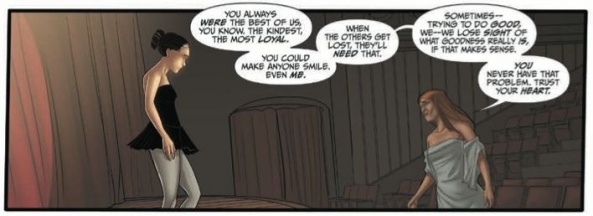
I relent that this may not be a popular opinion, and certainly every previous mention of death has remarked that that is the end. “Dead is dead” in this book, and when people die we do not see them anymore. That, if nothing else, is the biggest argument against my “Death of Akiko” theory.
Still. Based on everything we’ve seen in this issue, everything we’ve learned about this book from previous issues and everything we know about metaphors, I think Akiko is dead and that she’s now an angel.
Or, well, whatever counts for an angel within the context of “Morning Glories.”
But…
If there is a God, and there are angels, certainly there are demons? And certainly we’ve seen mention of the Devil…
And if Clarkson were an angel to some, couldn’t she just as well be a demon to others? Say, the Academy?

Amazing Grace
Amazing grace! (how sweet the sound)
That sav’d a wretch like me!
I once was lost, but now am found,
Was blind, but now I see.
As mentioned earlier, Fortunato is the one character in this series who seems to hold religion and his faith in religion above most everything else. He’s the only character that truly believes, that seems to find solace in his religious identity. And when it comes to faith, he now epitomizes it: some say that faith makes you blind, and — well.
But despite all of the horrible things that have happened to Fortunato, he has kept his faith.
Of course, I guess we can question why it is that he can “see” Akiko when no one else can. Sure, part of it could be that she is now dead and/or is an angel, that she’s being sent specifically to him so that he can find comfort in her and that she can “save” him. Another option would be that she literally got up from her coma and found herself down in the dungeon with him, though I’d find that more hard to believe.
Akiko visiting with Fortunato at the end is probably going to be a divisive element within discussion, since it’s probably the least defined aspect of the issue — and this is an issue that has a lot of non-defined aspects. Akiko does say, though, that she was sent by God specifically, and sent to Fortunato — so you can believe all my aforementioned theories about the events of this issue and where they’ve led to, or you can speculate and come up with your own. Either way, I’d love to hear your thoughts in the comments below, especially with this issue.
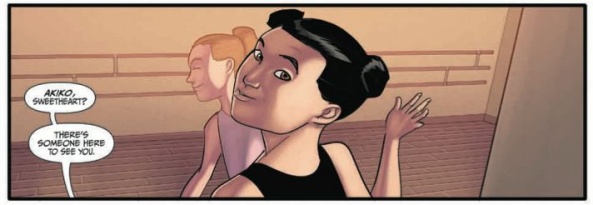
One Final Thought
So.
If there’s one thing that I have taken away from this issue, it’s that as much as there may be manufactured gods, there’s also a Real God. I would guess that between what Akiko’s father said and what the scientist said, that somewhere along the line Akiko and children like her were taken in and experimented on based on some kind of idea, assumedly established by the Academy. This idea seems to imply that the children have within them a special power that lies dormant in their mind, and if harnessed correctly, those powers can make the children like gods. But it doesn’t always work; sometimes things go wrong, and they go wrong horribly.
Yet there still is something out there that is allowing that power to be had in the first place. Some kind of higher, ethereal power that exists out there in the universe; some kind of creator, whether it be the typical religious idea of God or something different.
Continued belowThe events of “Morning Glories” have often been described as that of a chess game, and we always sort of assume that there are two players: the Headmaster and Abraham. But one thing we don’t always consider is what bigger elements there are out there that are moving in the background, whose machinations are secretly running everything. Because certainly, even if Abraham and the Headmaster are the main generals in the war, they’re obviously doing it for reasons. And if nothing else, everything in this book seems to tie back into various forms or religious ideology in one way or another, whether it be a very literal representation of religions ideas and icons and stories and themes or just spiritual notions.
Religion is very important to this book, and understanding and coming to grips with the complicated nature of faith seems to be the key to having any kind of idea of what is going on. Science only gets us so far, and we rely on science to explain certain aspects because we seem to want answers more than anything. But if there’s one thing I take away from an issue like this in a series like this, it’s that the answers are not always what is important.
Akiko may be dead. Akiko may also not be dead. I’m not sure, and only time will tell. Perhaps I’m just being pessimistic.
Sometimes, you just have to have faith.
As I’ve mentioned before, the Morning Glories Wikipedia is now live, featuring copious notes and annotations. While I’ve not written anything particular for it, I’ve contributed a few inklings here and there, and some notes are sourced for this very column in a cleaner database friendly fashion — so I guess think of it like this column, but with less “me” and more straight-up presentation of materials. Should be good for every time we get a name and are wondering if it has been mentioned before. (I particularly like this entry, myself.)
In further things you should be following, the Morning Glory Academy Study Hall podcast is live and updated with tons of episodes for you to listen to, including commentary for the fourth arc ‘Truants.’ You can find them streaming here on Multiversity Comics (see below for links) or on Podomatic and on iTunes. For those unaware of its purpose, this is a podcast that I do with Nick Spencer and Joe Eisma in which we discuss each individual issue at length, offering up commentary tracks to go alongside your reads. It’s pretty much the best.
Fifth arc discussion will be coming … soon. There may be other announcements coming as well.
And, oh, I suppose while linking to rival website isn’t good for Multiversity business, I will note that all-around good guy Kiel Phegley does a column called Morning Glory Days about “Morning Glories” where he interviews Nick that is a pretty interesting read for fans of the series. I won’t actively say you should visit other websites besides Multiversity, but I do like Kiel. It’s worth a read.
If you’d like to contact myself directly with thoughts or comments, shoot me an e-mail at the very specific mgastudyhall@multiversitycomics.com. I have a real e-mail that you can find at the bottom as well, should you prefer that.
I’ll see you in the backmatter!!
Previous Issues: #1, #2, #3, #4, #5, #6, #7, #8, #9, #10, #11, #12, #13, #14, #15, #16, #17, #18, #19,#20, #21, #22, #23, #24, #25, #26, #27, #28, #29, #30, #31, #32, #33, #34, #35, #36
Previous audio podcasts: second arc interviews, #7, #8, #9, #10, #11, #12, second arc wrap-up, NSRFQR, third arc interviews, #13, #14, #15, #16, #17, #18, #19, third arc wrap-up, all of the fourth arc
